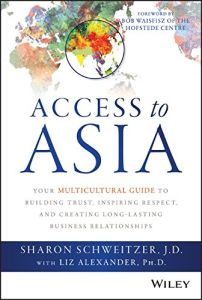Join getAbstract to access the summary!

Join getAbstract to access the summary!
Sharon Schweitzer and Liz Alexander
Access to Asia
Your Multicultural Guide to Building Trust, Inspiring Respect, and Creating Long-Lasting Business Relationships
Wiley, 2015
What's inside?
To build successful Asian business relationships, you must manage cultural complexities.
Recommendation
International etiquette consultant Sharon Schweitzer – writing with award-winning author Liz Alexander – provides simple, straightforward advice about cultural complexities and differences across major Asian markets. This clear, jargon-free and practical book helps you avoid giving inadvertent offense. Schweitzer frames her lessons around eight basic considerations. Her detailed information about social expectations includes charts, timelines and quizzes. She also explains what to do when negotiations or transactions hit rough spots. And she teaches, just as Mom did, that good manners matter everywhere. getAbstract recommends this easy-to-read guide to entrepreneurs, managers, negotiators, and anyone working with Asians or in Asia.
Summary
About the Authors
Etiquette consultant Sharon Schweitzer, advises Global 2000 and Fortune 50 companies. The author of 15 books, Liz Alexander, co-founded the Leading Thought consultancy.

















Comment on this summary